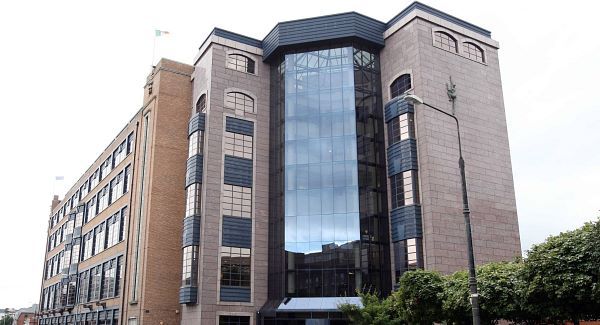Garda Representative Association calls on Garda Commissioner to‘speak out’


PJ Stone above right pic. and members of the Garda Representative Association, (GRA) following their meeting with the Garda Commissioner at Garda HQ in the Phoenix Park, Dublin, today.
The biggest organisation representing members of the Garda has called on Garda Commissioner Martin Callinan to speak out publicly about the lack of resources in the force instead of making “baffling” statements that the Government was providing him with all the resources he needed.
The Garda Representative Association (GRA), which represents 11,200 rank and file gardaí, has also said a planned protest action for Friday would go ahead despite its talks with Commissioner Callinan at Garda Headquarters, Phoenix Park , Dublin, today.
GRA general secretary PJ Stone said the talks between his 31-strong national executive and Commissioner Callinan had been “a very serious exchange” of views.
“I’m quite satisfied that some of the information which was given to him today in the strictest of confidence moved him and certainly gave him food for thought,” he said of the meeting arranged so the GRA leaders could outline the hardship their members were facing as a result of reduced remuneration.
“What we pointed out to the Garda Commissioner is that while he is given limited resources, well then that’s what should be said in the public ear when we are talking about resources that’s available. The Government have already left the Commissioner short in this year’s budget for the payment and provision of wages. So it baffles us when we hear then from the Garda Commissioner about the adequate resources that are available to him.”
“I think the Commissioner accepts fully that he has to operate within the budget that’s made available to him. But we also made the point that that budget does not allow for the proper provision of policing services then perhaps that’s what should be said so that people can be aware of it. He said he would reflect on that.”
Mr Stone said the action planned from Friday, when members of the GRA will refuse to use their own personal cars, phones or laptops for official in protest at Government proposals to cut their earnings, would not disrupt policing.
“It is merely intended to show that we’re serious; that there will be an incremental approach to any visit on the pay and conditions of the members of the Garda Siochana. I think it’s very unfair, and I think someone made the point to the commissioner, that we have members who when they retire do not enjoy the same longevity of life as others simply because they are working nights and weekends.
“And it is grossly unfair that in the discussions which are taking place currently, that people are going to reduce those earnings of members and they are hard earned…. they are penalty earnings as opposed to premium earnings.”
10% of HSE workers calling in sick despite ‘clampdown’
MINISTER JAMES REILLY SAYS ABSENTEE HEALTH WORKERS FACE INDIVIDUAL INTERVIEWS WITH THEIR MANAGERS.
Minister for Health James Reilly has said workers in the health service who are consistently sick will be brought in one by one for individual interviews with their managers
MORE than one in 10 workers are calling in sick in some parts of the health service despite promises to tackle the excessive scourge.
New figures show the worst hit area for absenteeism is the ambulance service in the north east, where 10.53pc were absent from work over the course of three months.
The rate is three times higher than the Health Service Executive (HSE) target and reveals how measures to crack down on the hugely costly problem are failing.
The sickness findings which are now published by the HSE are more comprehensive and cover a wider range of areas of the health service following the orders by Health Minister James Reilly who wanted a “name and shame” policy to highlight the issue.
The figures cover a span of three months last year which give a wider snapshot of the patterns of absenteeism,
The second highest rate at 8.19pc was in Roscommon County Hospital but was a massive 14.45pc among some of its staff.
In the Midlands ambulance service the absenteeism rate among administration staff hit a spectacular high of 17.91pc, according to the figures supplied by HSE.
The minister told the HSE last year that it needed to call in people who are habitual non-attenders, seek a second medical opinion, and refuse to hire agency staff to replace them so the pressure goes on their colleagues.
Tough
Overall, the HSE was far off reaching its 3.5pc absenteeism target and the rates for six months of last year were worse than the corresponding months in 2010.
The average rate was around 5pc last year and its best month was September when it dropped to 4.62pc, it emerged.
The HSE in the west confirmed last year that it dismissed three people in the past 12 months in response to persistent absenteeism.
And in addition, 104 other staff have been removed from the sick leave scheme
The HSE had promised to get tough on absenteeism and said monthly and quarterly absence reports are sent to each department by the hospital manager.
This is usually accompanied by reminders of their responsibilities to manage absence and request detailed “return to work interviews” from staff involved. Absenteeism in the west has been costing around €60m a year and €284m nationally.
The problem extends beyond hospitals and also affects community health services in areas such as east Limerick, Wicklow, Dublin west, Mayo and Westmeath. The HSE has insisted that tackling absenteeism remained a “key item on hospital management team agendas”.
National Treasury Management Agency to raise €500m in bond sale


Ireland is set to return to the bond markets on Thursday with a €500 million auction of treasury bills. It will be the sixth tranche to be sold since the National Treasury Management Agency (NTMA) re-activated the program last summer.
The monthly auction of three-month treasury bills follows a similar deal last month, when the NTMA sold €500 million at an annualised yield of 0.2 per cent.
The deal was significantly over-subscribed, with total bids of €1.894 billion received.
The NTMA has set a total funding target of €10 billion for 2013, as Ireland prepares its exit from the EU-International Monetary Fund bailout programme.
In January, the NTMA successfully sold €2.5 billion in a syndicated tap deal, while expectations are that it may also look to issue a 10-year benchmark deal this year.
However according to Owen Callan, senior analyst with Danske Bank Markets, it is now “increasingly likely” that the NTMA will delay its return to the long-term bond markets, given other factors on the agenda such as a possible sale of Irish Life Assurance and the impending Italian election.
“Waiting a few weeks before issuing is not without justification, even if risk/reward would argue for a more imminent engagement with the bond market,” he said.
Too much TV in childhood linked to long-term antisocial behavior


Excessive television viewing during childhood and adolescence was linked to antisocial behavior in adulthood, unrelated to pre-existing antisocial tendencies or other potential confounders.
Although there have been longstanding concerns that extreme childhood exposure to television violence could foster antisocial behavior, observational research has been unable to discriminate whether children with antisocial tendencies are attracted to violent programs or children develop behavioral problems due to viewing television violence.
“Despite the numerous forms of media now available, children and adolescents still use television the most,” Lindsay A. Robertson, MPH, and colleagues from the department of preventive and social medicine at the University of Otago in New Zealand wrote. “New technologies such as on-demand television and digital recording devices offer children and adolescents more opportunities to watch inappropriate programs without supervision from their parents.”
To investigate whether disproportionate television viewing throughout childhood and adolescence was connected with increased antisocial behavior in early adulthood, Robertson and colleagues evaluated a cohort of 1,037 children born in Dunedin, New Zealand, at regular intervals from birth to age 26 years.
The researchers used regression analysis to examine the relationship between television viewing hours from ages 5 to 15 years compared with aggressive personality traits, criminal convictions, violent convictions or diagnosis of antisocial personality disorder in early adulthood.
According to analysis results, young adults who had spent more time watching television during childhood and adolescence were significantly more likely to receive a criminal conviction, a diagnosis of antisocial personality disorder or exhibit aggressive personality traits vs. those who watched less television.
In addition, this relationship was similar for both sexes, suggesting that the association between television viewing and antisocial behavior is similar for male and female viewers.
“More time spent watching television in childhood and adolescence is associated with antisocial behavior in early adulthood. These associations were not explained by pre-existing antisocial behavioral problems, lack of parental control, socioeconomic background, or IQ,” Robertson and colleagues wrote. “We believe that identifying ways to reduce children’s and adolescents’ television viewing should be considered a priority for public health.”
Court convictions secured for poor school attendances


A TOTAL OF 30 COURT CONVICTIONS WERE SECURED AGAINST PARENTS IN IRELAND LAST YEAR DUE TO THE POOR SCHOOL ATTENDANCE RECORDS OF THEIR CHILDREN.
Taken by the National Educational Welfare Board – which was set up in 2002 under the Education (Welfare) Act 2000 – these cases illustrate the importance of parents making sure their kids go to school on a regular basis and only miss lessons when there is a valid reason for doing so.
In one instance, the mother of a 15-year-old girl who missed more than 60 per cent of the school days she should have attended over a period of ten weeks pleaded guilty to breaching a school attendance notice, the Irish Times reports.
The case was heard at Limerick District Court and saw the parent’s solicitor requesting the case be adjourned to allow the pupil to make significant improvements in her attendance.
Judge Eugene O’Kelly explained a notable increase in the girl’s attendance could have an influence on the decision of the court and agreed to adjourn the case until April 5th.
Study finds dolphins mimic calls of social group


Dolphins mimic the unique calls of those they share a strong social bond with, such as offspring
Dolphins mimic the distinct whistles of their closest companions as a way of tracking them, according to researchers.
A team of marine biologists from the University of St Andrews studied the vocal signatures of the mammals.
Their findings suggested that dolphins mimic those they are close to and want to be reunited with.
It was already known that dolphins develop their own individual whistle which describes their identity.
The team of Scottish and American scientists analysed recordings from wild and captive dolphins to identify which animals copy one another’s signature whistle.
Social bonds
The St Andrews researchers, working with scientists at the Walt Disney World Resort in Florida, found the mimicking was only present in mothers and their offspring, as well as in adult males who copied those they had long-term associations with.
This could give us a real insight into how certain traits in language and communication have evolved”
The research involved a group of dolphins in Sarasota Bay, which has been studied since the 1970s. The animals are brought into captivity for medical tests once a year, which allowed the marine biologists to record and study their calls.
Dr Stephanie King, from St Andrews University, said: “Interestingly, this mimicking only occurs in animals who have strong social bonds.
“It also only occurs when they are separated from each other, and this supports the idea that they want to reunite with the other animals.
“The next step is to do some experiments to play back their own calls and whistles to see if they can identify them.”
The study also found that dolphins introduce slight changes into copies, avoiding confusion for the listener.
While vocal mimicking is found in other animals like song birds, the team believes dolphin calls offer an insight into the way complex language structures evolve.
Dr King said: “It is something we see in ourselves, but not in other animals.
“This could give us a real insight into how certain traits in language and communication have evolved.”

No comments:
Post a Comment